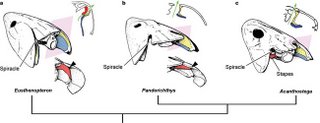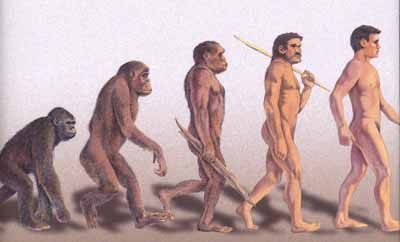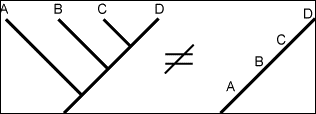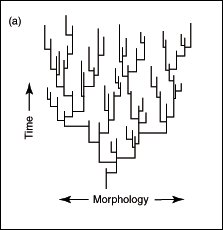Perhaps the most common misconception of evolutionary theory would be that evolution is not a case of continual progression from primitive organism to advanced organism. It is not a ladder. Rather, the evolution and eventually speciation of living things is --and should be viewed as-- more of a tree with multiple branches. Evolution is not a matter of chance in an organism until it reaches perfection. The most commonly known imagery of this misconception is the unfortunate primate to human illustration.
Evolution occurs when it becomes vital that an organism adapt to its changing surroundings. Climate changes, rivers shift their course and mountains rise and fall with erosion, new alien species invade and compete with native organisms. An adaptation that evolved from one situation or environment doesn't work as well as other traits made for another scenario. Fitness is linked to environment and not to progress.
The correct ( left ) and incorrect phylogenies shown.
The concept of perfection does not exist in the natural world. Organisms only progress and evolve to a point in which they fit comfortably into a niche within the environment. From there, they need not continue evolving but remain static in change until it is otherwise necessary. For example, taxa such as mosses, protists, fungi, sharks and crayfish have changed little over the course of geologic time. All of these living things have found a niche that has required little change over time. They are --to put it in the words of Kenneth Miller-- all winners of evolution. "The microscopic bacteria that sit on the edge of my coffee mug are just as much winners as I am." I envy Miller's choice of words.
Thus the reason for the concept of punctuated equilibrium. Though the highly celebrated idea was never original in context ( Darwin himself proposed the idea --see Chapter 4, page 152 of The Origin ), it puts in words exactly what evolution is and what it is not. Evolution occurs when necessary. Natural selection is merely a personification of environmental change that forces living organisms to adapt. Once an organism evolves to obtain a unique trait to match its needs in that environment, evolutionary change slows down. Eventually, those said organisms would need to evolve again to the physical changes in the environment. Little change punctuated by rapid change. Punctuated equilibrium.
Continuing on our reasoning for why evolution is not about obtaining perfection, let us now view the natural constraints that render any pure 'perfection' as impossible. Natural selection can only operate with what is available. Thus the idea that a random characteristic of an organism can appear almost spontaneously is infeasible. The jaws of tetrapods were first originally modified from ear bones and the first ears evolved from fish gills. If a gene for a particular trait is not in the population from mutation or gene flow, the evolution of this characteristic will not occur.
 The evolution of ears from fish gills
The evolution of ears from fish gills
Yet in order to increase speed in the species, natural selection would have two options. The cheetahs' metabolism would need over-excessive amounts of energy not easily accessible in the habitat or the leg lengths of the cheetah could increase to cover more distance but fall into the risk of having slimmer, more hazardously delicate bones. Hence, there would be no 'net increase' for the cheetah to become faster than it is now.
 A Acinonyx jubatus ( cheetah ) in action
A Acinonyx jubatus ( cheetah ) in action
To end this discussion on a light note, it is because evolution is not a continual, ladder-like progression that we can appreciate the vast diversity of life on Earth. It is with the ever-changing surroundings on this planet that life must continue to adapt and produce new varieties of organisms to maintain ecological balance. Darwin has perhaps put this into the most poetic of words:
'There is grandeur in this view of life, with its several powers, having been originally breathed into a few forms or into one; and that, whilst this planet has gone cycling on according to the fixed law of gravity, from so simple a beginning endless forms most beautiful and most wonderful have been, and are being, evolved.'






No comments:
Post a Comment